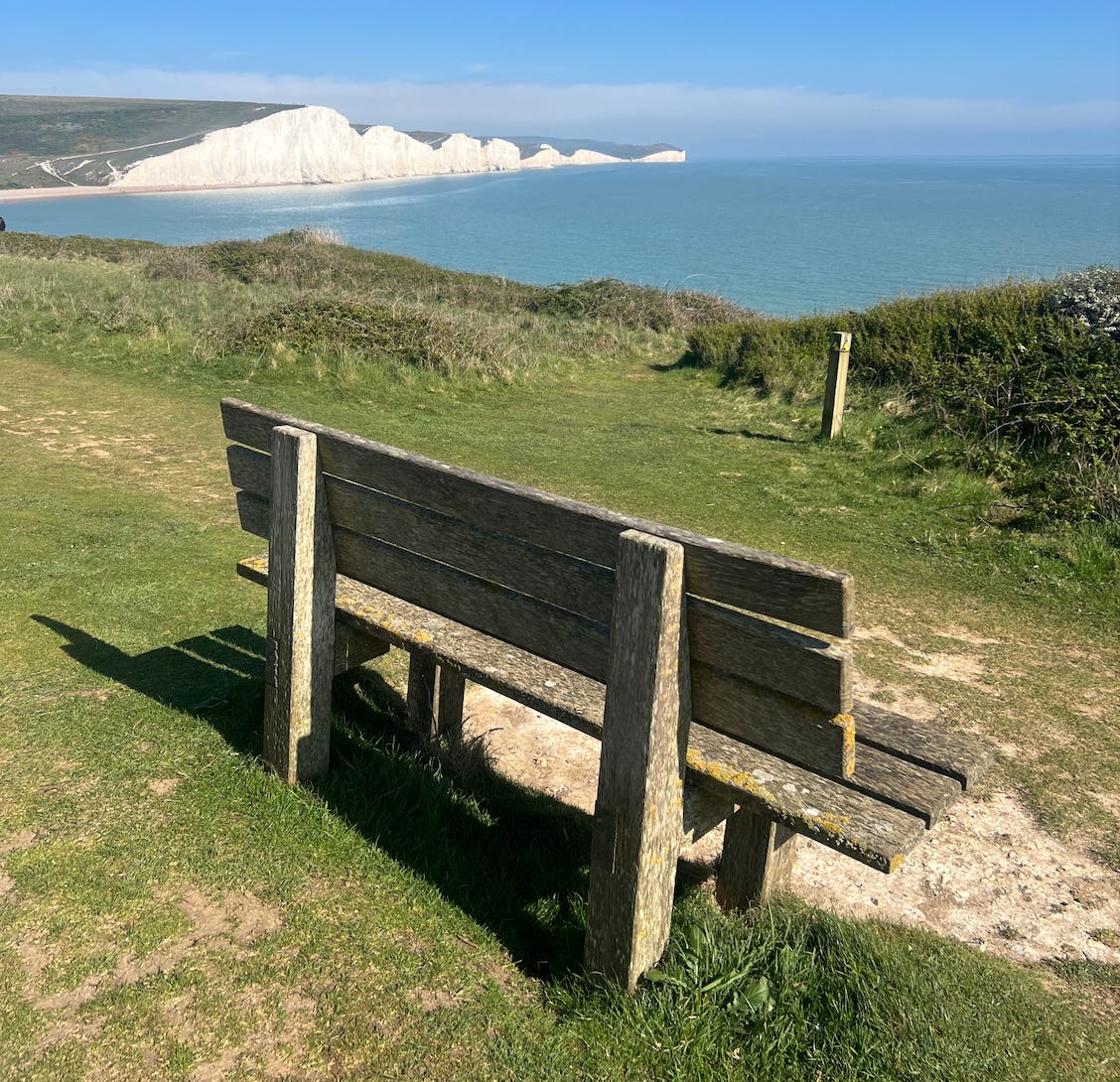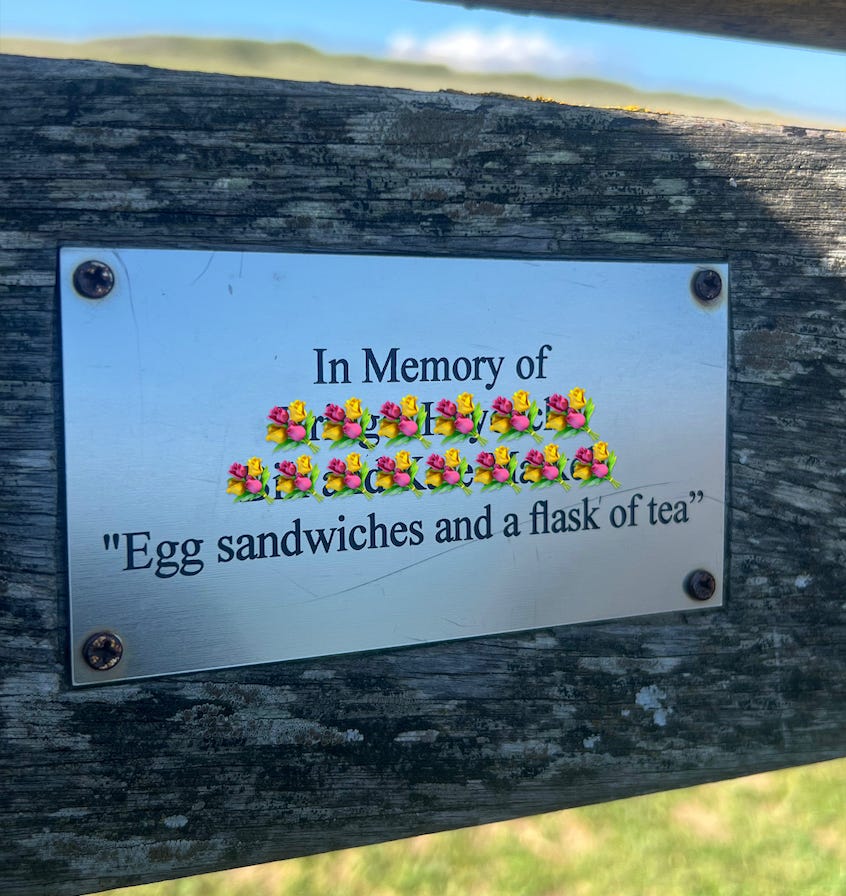What Milan Kundera taught me about egg sandwiches and a flask of tea.
Immortality within.
I was hiking with my girlfriend toward the Seven Sisters in East Sussex, England. Chasing the Sun, exploring the hill, hearing the wind, contemplating my feet stepping onto the grass, but also thinking of those who might have walked these very spots centuries ago, and how many will walk them in the centuries to come.
It’s funny that mountains will remain eternal, but meanwhile, our experiences can fade away, or we may not realise we had them in the first place. In 1829, a few years before he died, Johann Wolfgang von Goethe made the case for immortality that has nothing to do with religious faith or a permanent soul, but rather with us being immortal as those who, after their death, remain in the memory of posterity.
What you remember from your childhood will be immortal.
The intense experiences you’ve had, either guided by moral actions or ordinary events, alone or with beloved ones, will be immortal.
They are immortal to you, to your memories, and sometimes to those of others. We can try to dictate them, but we can’t stop some things from remaining.
The Czech and French novelist Milan Kundera wrote that everyone can achieve immortality for a short or long time, depending on the strength of the act. Great immortality, though, is the one achieved in the mind of people who never knew you personally.
A creative act is closer to great immortality. We still appreciate the paintings from the 16th century dearly, and so did those we admire from history. Have you ever wondered how crazy it is that George Washington or Gertrude Bell knew and probably visited exhibitions featuring the same paintings we see today by Rembrandt or Da Vinci?
Or also the immortality of books and favourite music. Maybe reading a Hemingway novel, or a letter that someone wrote long ago. Maybe listening to favourite songs that you first heard when you were 12, and now, years later, listening again and evoking different feelings, yet speaking to the same ageless part of you. Sometimes even more broadly, as the musicals that we don’t stop talking about and fill any theatre play (Victor Hugo wrote Les Misérables over 160 years ago!).
But are the feelings from walking also immortal? It is well to ponder Kundera's saying that there are fewer gestures or feelings than human beings. In his view, we repeat each other's expressions; we identify our gestures through social cues, movies, and images: joy, excitement, laughter, sadness. Could there be thousands of gestures? Perhaps even more, but still not as many as the billions of humans. Hence, can one empowering feeling, such as walking, be more individual than the individual who experiences it?
Call it a walk, a run, a wheelchair act, or a chasing movement that engages your entire body. It’s so underrated that we might overlook it as a form of medicine in every successful story that we find.
From Charles Darwin, taking two strolls per day, having his “thinking path” after his exploration trips.
One step in, and then the other, to Jane Austen's characters meeting each other through crucial points amid walks in the countryside.
Martin Luther King Jr, as a seminary student at Crozer, taking an hour walk each day through the campus woods to “commune with nature.”
The dawn of Gandhi’s non-violent protest, gathering thousands across India to walk 240 miles in the Salt Path against English occupation, succeeding, again, mostly by walking. And then the rise of other movements afterwards, doing the same.
Walking helps us either reap the best part of ourselves or shut down the worst. “If you are in a bad mood, go for a walk,” says the wise and ancient Hippocrates, “and if you are still in a bad mood, go for another walk.” You can also walk because you are escaping from something, or maybe to just go in one direction, ending at your real starting point, discovering yourself.
To breathe in and breathe out. A combination of movement, humility, balance, curiosity, smells, sound, and light. To ground our thoughts in the same lands where many others have walked before us and where countless others will follow. “The moment my legs begin to move, my thoughts begin to flow”, writes Henry David Thoreau.
Walking is a friend of time. It slows moments down, forcing our legs and minds to think, sensing hours into minutes. On the contrary, “I sometimes think car drivers don’t know what grass is, or flowers, because they never see them slowly,” as Ray Bradbury wrote in Fahrenheit 451, challenging those who rush.
It is through walking that we appreciate the changes. Take the same walk every day, and you will start to notice every single detail on your way: the blossom, the decay, the seasons, the faces, the place, or the random static litter that you will finally volunteer to clean.
How broadly we can describe walking, yet how personal and perennial it feels. “Maybe we were made to walk,” says the writer and explorer Erling Kagge. If done long enough, walking can connect us more deeply to a sense of longing, the ultimate muse, a feeling in which we try to reach for something without finding it.
As Susan Cain describes in her book Bittersweet. The ancient Greeks called this pothos, which Plato defined as a yearning desire for something wonderful that we can’t have. The Portuguese have the concept of saudade, a sweetly piercing nostalgia, often expressed musically, for something deeply cherished, long gone, that may never have existed in the first place. In Hinduism, viraha—the pain of separation, usually from the beloved—is said to be the source of all poetry and music. Immortal.
But it was in the third hour of our walk, as we were returning from the Seven Sisters, that I noticed how genuinely we needed to take a rest. After all, walking, like any other exercise, is appreciated for the type of pain it creates and the great relief and well-being it gives once it’s over. As Arthur Schopenhauer said, “Only pain and want can be positively felt.” Pausing and being still in the midst of a walk in nature is like taking a “forest bath,” or shinrin-yoku, as the Japanese call it.
Looking for an ideal place to sit on top of the cliff, we noticed how common it was to have wooden benches spread along the edge, overlooking the horizon. However, each seat in Seven Sisters has plaques commemorating people who have passed away. Another attempt at Goethe’s immortality. The plaques bore the names, the dates of their lives, and a message: “A beloved brother,” “a wonderful mother,” “my wonderful dad.” Many of them noticed the meaningful contemplation:
“As dawn slips unseen over the horizon. The morning kneels & kisses the sea. Sleep in the stars & dream.”
“With a jovial laugh and artistic eye, who enjoyed this splendid view of the Seven Sisters.”
“Whose sparkling eyes enjoyed the views of Hope Valley and the Seven Sisters.”
Those benches were proper immortality readings. Reading these words makes me wonder how little we use them, how much better things could be if we used them more, or if we measured more of the right things.
But then I saw it: a whole bench with just one commemorative plaque, only with the name and message: “Egg sandwiches and a flask of tea.”
That was it.
I reread it and thought about it.
I researched and found that donating one bench with a commemorative plaque to the Seaford Town Council in East Sussex costs £1,285, and the waiting list is closed. What? That some individuals decided to donate something so meaningful, expensive and limited, on top of one of the Seven Sisters’ most iconic points, quoting egg sandwiches, and a flask of tea? That is the exact definition of epic.
I wonder if it was the most rewarding moment of their walks over the cliffs, recovering their energy, sitting on the grass, opening their backpacks and pulling out their quote, tasting the flavour of joy. Perhaps they did this for many days, again and again. Perhaps the sandwiches had a purpose, mirroring another memory, or a favourite blend, paired with black tea or an Earl Grey. Or maybe it was just one special time, on a long day, with a clear sight. Maybe there, gilded by the setting Sun, they said everything that they needed to say to each other, and they found immortality too.
And then I asked myself: maybe you don’t have to be immortal to have the immortal live in you? Sacredly remembering the preciousness of our feelings and moments, especially those shared with others whom we either meet by blood or select in life, from walking, from companionship, from a cliff view and the sound of the sea, with egg sandwiches and a flask of tea.
Sources
[1] Conversation between Johann Wolfgang von Goethe / Johann Peter Eckermann
[2] Immortality - Milan Kundera
[3] Walking - Erling Kagge
[4] Fahrenheit 451 - Ray Bradbury
[5] Bittersweet - Susan Cain
[6] Stillness is Key - Ryan Holiday
[7] Seaford “Memorials-Brochure-June-19-1.pdf”




Lovely and moving!
So wonderful to read your essays again! I found it really moving. Loved this one 💛